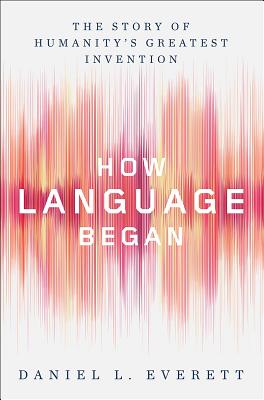語言是人類統治地球的權杖,但它是從哪來的呢?
顛覆你我對於語言起源的理解!
顛覆你我對於語言起源的理解!
人類比地球上其他的物種相比具有明顯的優勢:我們彼此交談。但是,我們是如何獲得地球上最先進的溝通方式?語言學家Daniel L. Everett從最早嘗試說話的人類到七千種語言並存的今日,在漫長的歷史中重現語言發展的進程。
雖然考古學家和語言學家曾帶我們越來接近發掘語言的真正起源,Everett的發現已顛覆當代語言世界,獲得廣大迴響。在亞馬遜叢林進行實地調查時,他在一個狩獵採集部落遇到了一個古老的語言。Everett將理論建立於語言並非我們物種原生的基礎之上,挑戰這個領域的既定原則。為了真正理解它的起源,需要更加跨學科的方法。就像我們的生物構成一樣,我們的文化傾向也一樣重要。
在Everett的理論中,是直立人(Homo Erectus)開始透過文化發明的符號來催化詞語。早期的人類,隨著他們的大腦越來越大,把姿態和語調揉合在一起進行交流,相互影響了上萬代。追溯各個時期的重要轉變和發展,Everett從喉嚨和橫隔膜間上百個呼吸肌肉的控制到掌握舌頭的使用,拆解語言每一個組成部分。從生物學以降,Everett探討了為什麼文法和講故事等元素不像人們所質疑的那麼重要。
在書的最後一節「語言的文化演進」中,Everett將不斷爭論的「語言鴻溝」視為一項任務,鑽研將「人類」與「動物」分開的顯著差別。他從人類學、神經科學和考古學著手,認為是社會的複雜性以及文化、生理和神經學的優越性,允許人類用無爪的手、易碎的骨頭和柔軟的皮膚,成為地球最高的掠奪者。
本書最終解釋我們知道什麼、我們想知道什麼,以及我們可能永遠不會知道人類如何從單純的溝通到複雜語言的生成。根據他近四十年的實地考察,Everett駁斥了一些偉大思想家如柏拉圖和杭士基等人長期以來的理論。《How Language Began》是對人類而言非常寶貴的研究,值得細細品讀。
【文/博客來編譯】
How Language Began revolutionizes our understanding of the one tool that has allowed us to become the "lords of the planet."
Mankind has a distinct advantage over other terrestrial species: we talk to one another. But how did we acquire the most advanced form of communication on Earth? Daniel L. Everett, a “bombshell” linguist and “instant folk hero” (Tom Wolfe, Harper’s), provides in this sweeping history a comprehensive examination of the evolutionary story of language, from the earliest speaking attempts by hominids to the more than seven thousand languages that exist today.
Although fossil hunters and linguists have brought us closer to unearthing the true origins of language, Daniel Everett’s discoveries have upended the contemporary linguistic world, reverberating far beyond academic circles. While conducting field research in the Amazonian rainforest, Everett came across an age-old language nestled amongst a tribe of hunter-gatherers. Challenging long-standing principles in the field, Everett now builds on the theory that language was not intrinsic to our species. In order to truly understand its origins, a more interdisciplinary approach is needed―one that accounts as much for our propensity for culture as it does our biological makeup.
Language began, Everett theorizes, with Homo Erectus, who catalyzed words through culturally invented symbols. Early humans, as their brains grew larger, incorporated gestures and voice intonations to communicate, all of which built on each other for 60,000 generations. Tracing crucial shifts and developments across the ages, Everett breaks down every component of speech, from harnessing control of more than a hundred respiratory muscles in the larynx and diaphragm, to mastering the use of the tongue. Moving on from biology to execution, Everett explores why elements such as grammar and storytelling are not nearly as critical to language as one might suspect.
In the book’s final section, Cultural Evolution of Language, Everett takes the ever-debated “language gap” to task, delving into the chasm that separates “us” from “the animals.” He approaches the subject from various disciplines, including anthropology, neuroscience, and archaeology, to reveal that it was social complexity, as well as cultural, physiological, and neurological superiority, that allowed humans―with our clawless hands, breakable bones, and soft skin―to become the apex predator.
How Language Began ultimately explains what we know, what we’d like to know, and what we likely never will know about how humans went from mere communication to language. Based on nearly forty years of fieldwork, Everett debunks long-held theories by some of history’s greatest thinkers, from Plato to Chomsky. The result is an invaluable study of what makes us human.
20 illustrations; map
Review
“Very few books on the biological and cultural origin of humanity can be ranked as classics. I believe that Daniel L. Everett’s How Language Began will be one of them.”- Edward O. Wilson, University Research Professor Emeritus, Harvard University
“When I first became interested in cultural evolution, cognitive revolutionaries would say that Noam Chomsky had proved that an innate language acquisition device was the key to linguistics. Daniel Everett is a leader of the counterrevolution that is putting culture and cultural evolution back at the center of linguistics, and cognition more generally, where I think it belongs. How Language Began is an accessible account of the case for a culture-centered theory of language.”- Peter Richerson, Distinguished Professor Emeritus, Department of Environmental Science and Policy, University of California Davis
“Moving far outside historical linguistics, Everett credits Homo erectus with having invented language nearly two million years ago. This communicative invention came not―in Everett’s view―in one revolutionary breakthrough but, instead, at the slow pace typical of evolution, as early hominids gradually organized themselves in ever-more-complex social groupings, eventually learning to fashion culturally weighted symbols and then to manipulate such symbols in communicative strings, so setting the evolutionary stage for the planet’s only loquacious species: Homo sapiens. . . . Certain to spark that liveliest form of language―debate!”- Bryce Christensen, Booklist
“[Everett] mixes esoteric scholarly inquiry with approachable anecdotal interludes to surmise how humans developed written and spoken language and why it became vital for survival and dominance. As in his previous books, Everett energetically attacks the long-accepted theory of Noam Chomsky that humans are born with the language instinct, including innate rules of structure....That Everett is skilled at leavening an intellectually challenging treatise with humor is evident on the first page of the introduction.”- Kirkus Reviews
“Provocative and ambitious. . . . Applying semantics, linguistic theory, cultural history, and popular culture, [Everett] makes a convincing case for the multimodal nature of language--a phenomenon that engages 'the whole person--intellectual emotions, hands, mouth, tongue, brain.' . . . This volume will be of interest to linguists, cultural critics, and anthropologists as well as informed readers interested in the evolution of language.”- Herbert E. Shapiro, Library Journal
“How Language Began occupies a rare literary space that explains complex issues clearly to general readers while being an original contribution to scholarship...the arguments he marshals and insights he provides are impressive...anyone interested in language would gain from reading this book.”- Oliver Kamm, Times
“Ambitious...the subject-matter is completely enthralling...Everett is at the very top of his intellectual game.”- Harry Ritchie, Spectator
“Important and fascinating.”- Adrian Woolfson, Prospect












